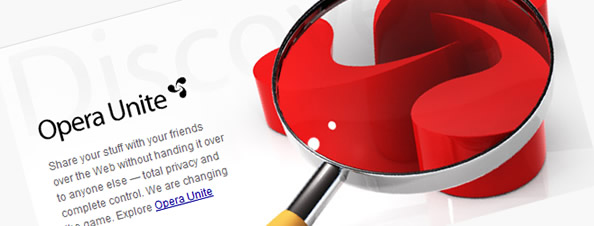
You may have read our blog post about Opera unveiling a service that will change the web last week, if you did then no doubt you will have been as intrigued as the Union Room team as to what the Opera team were planning.
Well, the wait is finally over as Opera today unveiled their new service, and it’s named Opera Unite. The service essentially makes every computer running the Opera browser a we-server, enabling the ability to share data such as images, music, video and also run websites and chat rooms without depending on third-party software.
The service will initially offer ’simple’ services such as messenger apps and media players but “the potential for what can be done is much larger” says Lawrence Eng, product analyst for Opera Software. Opera Unite is Operas answer to “the internet’s unfulfilled promise” and Eng goes on to explain why they’ve decided to tackle such a large aree:
“Originally the Internet’s promise was that it would connect us all, bringing people together in a whole new way, bypassing the constraints of geography. The Web meant that we could all be part of a larger human network. How we actually interact with each other online, however, has been shaped by particular techno-social circumstances. Because of those circumstances, our online interactions have been constrained and are far from perfect. Undoubtedly, the ability to participate online has increased, especially for people in developed countries. Self-publishing, self-expression, and social networking retain their status as the cornerstone of online activity for millions of people around the world. That said, people who create and share content will never approach true empowerment online until the computers they use are actually part of the Internet. Currently, most of us contribute content to the Web (for example by putting our personal information on social networking sites, uploading photos to Flickr, or maybe publishing blog posts), but we don’t contribute to its fabric — the underlying infrastructure that defines the online landscape that we inhabit. Our computers are only dumb terminals connected to other computers (meaning servers) owned by other people — such as large corporations — who we depend upon to host our words, thoughts, and images. We depend on them to do it well and with our best interests at heart. We place our trust in these third parties, and we hope for the best, but as long as our own computers are not first class citizens on the Web, we are merely tenants, and hosting companies are the landlords of the Internet.”
While this may whet the appetite for the tech-minded among us, what does this mean for the end-user? What does all this theory translate into for a user experience and application? Well, one example of use could be the Opera Unite Jukebox:
“Instead of just choosing a song and forcing all of my online friends to hear it, the Opera Unite Jukebox will let me choose 10 songs from my collection and put it in the queue, and all 8 of my friends who are connected to me (via Opera Unite) will do the same. In doing so, we create a virtual jukebox that contains the songs we’ve all selected. The jukebox will then play the songs to all of us (in random order), creating a shared listening experience. It’s sort of like online radio but with a social component, harking back to the days of going to a friend’s house to listen to records/tapes/CDs together”
The scope for what the Unite applications can do is “just about anything” says Eng, which gets us very excited.
Keep an eye out for more news trickling through about Opera Unite services in the near future.